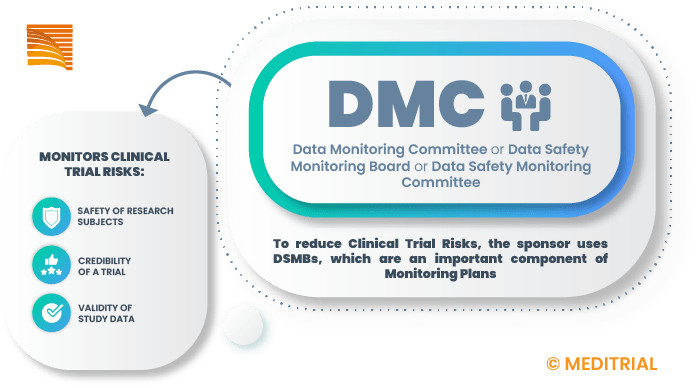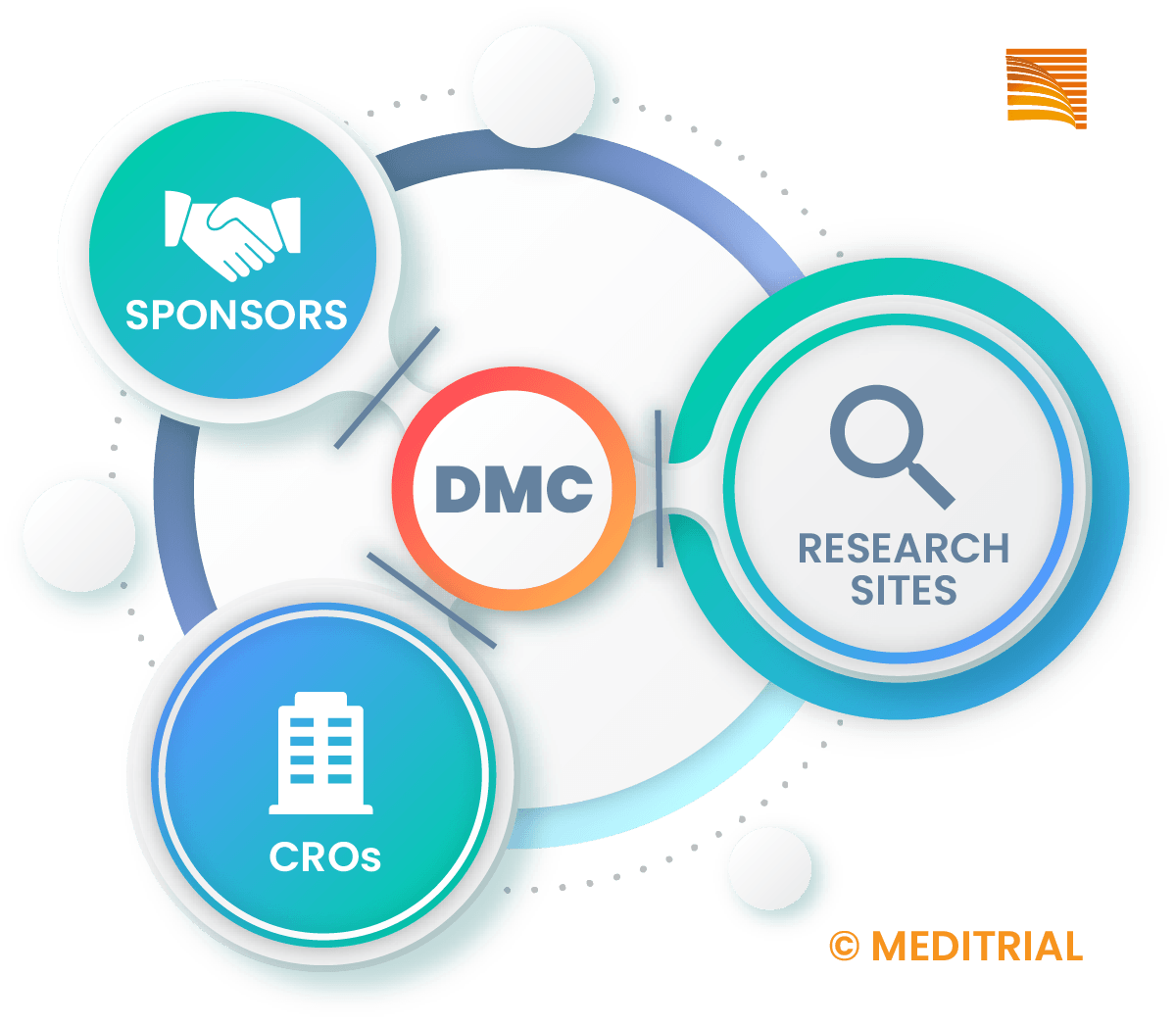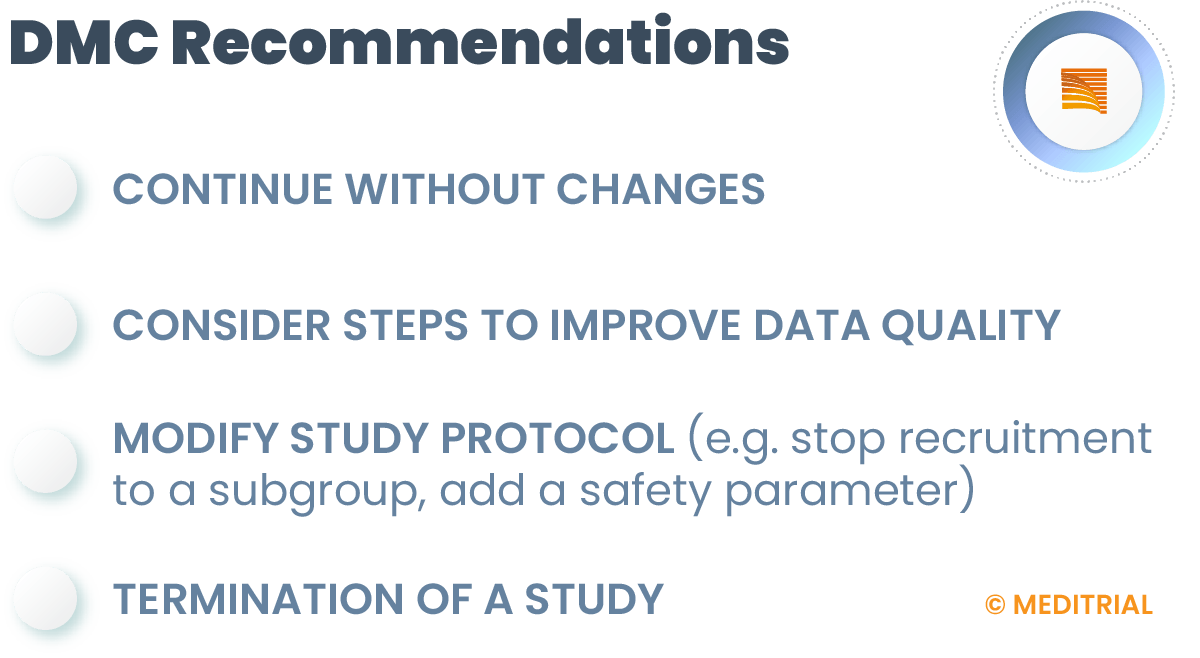Dr. Paola Antonini, Meditrial Scientific Director
All clinical trials benefit from oversight, which is currently provided by regulatory authorities, Ethics Committees or Institutional Review Boards, and Data Monitoring Committees (Dmc), also sometimes referred to as Data Safety Monitoring Boards (Dsmb).
The role and use of Dmc have evolved over the past decades. In this growth, the regulatory authorities, Fda and Ema especially, have provided considerable regulatory impetus, publishing guidelines on the role and operation of Dmc: “Establishment and Operation of Clinical Trial Data Monitoring” published by Fda in March 2006 and “Guideline on Data Monitoring Committees” published by Ema in July 2005.
Dmc are also mentioned in the ICH guidelines. In particular, ICH E3 (Structure and content of clinical study reports), ICH E6 (Good clinical practice), and ICH E9 (statistical principles for clinical trials) describe what analytical and statistical procedures should be adopted for monitoring and analyzing data from a study.
Dmc, using data provided by the sponsor, conduct periodic risk-benefit assessments during the course of the clinical trial. Dmcs may suggest discontinuation of a trial because of evidence of high risk to patient safety and conversely may also expedite early termination or rapid completion of a trial that shows significant therapeutic benefit.
Dmcs consist of a group of clinical experts with a proven track record in the disease/population of patients under study and methodological experience in clinical trials. In order to avoid conflicts of interest, this group of experts is not part of the pool of researchers performing the study.

Dmc play an extremely important role in protecting participating subjects. Independent oversight of the Dmc is essential to mitigate the risks of study participants and ensure that clinical trials have adequate safety data monitoring plans (safety monitoring).
Dmc also evaluate the integrity and reliability of the data with regard to critical efficacy endpoints and make recommendations regarding modification, continuation, or termination of the study.
DMCs generally are governed by a procedural document (Charter). The Charter generally includes the schedule and format of meetings, how results are to be presented, and which personnel may have access to interim data and attend DMC meetings. In addition, the Charter details the procedures adopted by the committee to determine the conflict of interest of its members and what data the sponsor must provide. In order to carry out their functions, Dmc must also have direct access to “unblinded” data. The ability of Dmcs to monitor trial progress and ensure patient safety could be compromised if access to “unblinded” data is not given.

When are Dmc’s needed?
An independent Dmc is an effective and more than appropriate way to provide a safety monitoring plan; however, not all studies involve the establishment of a Dmc or Dsmb. Guidelines provide nonbinding recommendations on whether a Dmc should be employed during a clinical trial. In general, there is agreement among the guidelines that the use of a Dmc is strongly recommended for large clinical trials in which:
- there are specific reasons that may compromise patient safety, such as a particularly invasive procedure;
- preliminary information suggests a high risk of toxicity that requires periodic analysis of adverse event (AE) data to determine whether toxicity endpoints have been met;
- the study is conducted in a potentially fragile population. This includes, but is not limited to, children, the elderly, and the terminally ill;
- the study target population is at high risk of death or other serious adverse events (SAEs), even though the study addresses a minor endpoint.
Under these specific trial conditions, ethics committees (ECs) and regulatory authorities could also mandate the establishment of a Dmc.
For some studies, particularly those that are blinded and placebo-controlled, treatment efficacy is difficult to understand until the study is completed. In these cases, the only independent body that can allow effective interim monitoring of treatment and access to blinded data is the Dmc itself.
It clearly emerges how Dmc are currently recommended only for certain types of studies. For example, regulatory authorities generally do not expect Dmc involvement for trials of products at an early stage of development (Early Phases Development).
The Future
Dmcs must respond to several challenges that are not adequately considered in current regulations. One of these is the lack of regulatory requirements that may prompt the sponsor to involve and appoint a Dmc. As we have already noted, Dmcs are not actually required in the majority of clinical trials, including early-stage development studies.
Nevertheless, the utility of DMCs is turning into a necessity, particularly when there is a relevant risk inherent in the study, and especially when the design and statistical complexity warrant periodic monitoring and independent assessment, as in the case of unified phase I/II studies and studies with adaptive design.
Another key and sometimes not easily resolved issue is to identify members of Dmcs with appropriate skills and experience specific to the study. In fact, Dmc require multidisciplinary skills and experience, including knowledge of statistical methods for monitoring data. However, there are no standards or practical guidelines regarding the specific qualifications of Dmc members, and this can be a problem.
To limit this regulatory gap, most sponsors apply standard operating procedures that govern internally within the company the methods to be used in identifying potential Dmc members. A strategic and standardized training plan for members and statistics teams would be a necessary step for the successful operation of DMCs in the coming years.
Another challenge for Dmcs is balancing conflicts of interest and thus the independence of the monitoring committee as required by regulations. Independence of members should include not having any involvement in the design and conduct of the study other than through their primary role on the monitoring committee; in addition, members should not have any financial or other ties to the sponsor, CROs, and research sites such that their impartiality in evaluating the clinical data could be affected.
However, it should be noted that Dmc are rarely, if ever, completely independent of the sponsor, since it is the sponsor who generally appoints members and reimburses them for expenses and services rendered. The best way to comply with the independence required by regulations is for the sponsor to appoint an outside third party who can administer the Dmc.
Other avenues often pursued include the use of procedures for ongoing verification of conflicts of interest and the establishment of standardized practices for clear communication between sponsors and Dmc.

Inherent difficulties for members of a DMC
During the course of the study after an interim analysis, the Dmc may make a recommendation to the study’s governing body to either proceed with the study as planned or terminate it early. In most cases, clinical trials continue on their course, with no particular recommendations or major changes to the protocol while in some cases critical trends may emerge that could lead to termination of the trial. Such trends may subside as the trial progresses, which requires Dmc members to be very cautious in the positions they take, as early termination of the trial can certainly in some cases avoid potential harm, but may also limit the benefits of treatment for subjects and the development of the new therapy.
Deciding when to terminate a trial can therefore present complex ethical issues and paramount to the safety of the subjects enrolled in the study.
In such a scenario, it is appropriate for the Dmc to protect the confidentiality of interim data from external pressures. Public sharing of provisional and as yet inconclusive data may introduce bias into the conduct of the study and threaten the validity of the results.
Another critical issue that a Dmc member must address concerns the relevant and pertinent information to be analyzed. In most cases, the selection of information that the sponsor must submit to the Dmc include study enrollment rates, data integrity, demographic characteristics, safety information, and interim efficacy data. Dmc members should also be informed by sponsors or investigators of any other relevant aspects they deem necessary for adequate and complete evaluation of the study.
In the absence of all relevant information, the Dmc’s ability to protect study participants may be hampered and greatly reduced. To limit these errors, sponsors or delegated CROs are responsible for the quality of reports and data that are provided to the Dmc. CROs (https://www.meditrial.net/) experienced in the field can support sponsors in analyzing data and processing reporting for Dmc.

Bibliography
- Guidance for Clinical Trial Sponsors (Establishment and Operation of Clinical Trial Data Monitoring)
- Committee for medicinal products for human use(CHMP) (Guideline on Data Monitoring Committees)
- ICH E3 (Structure and content of clinical study reports)
- ICH E6 (Good clinical practice)
- ICH E9 (Statistical principles for clinical trials)







Leave A Comment